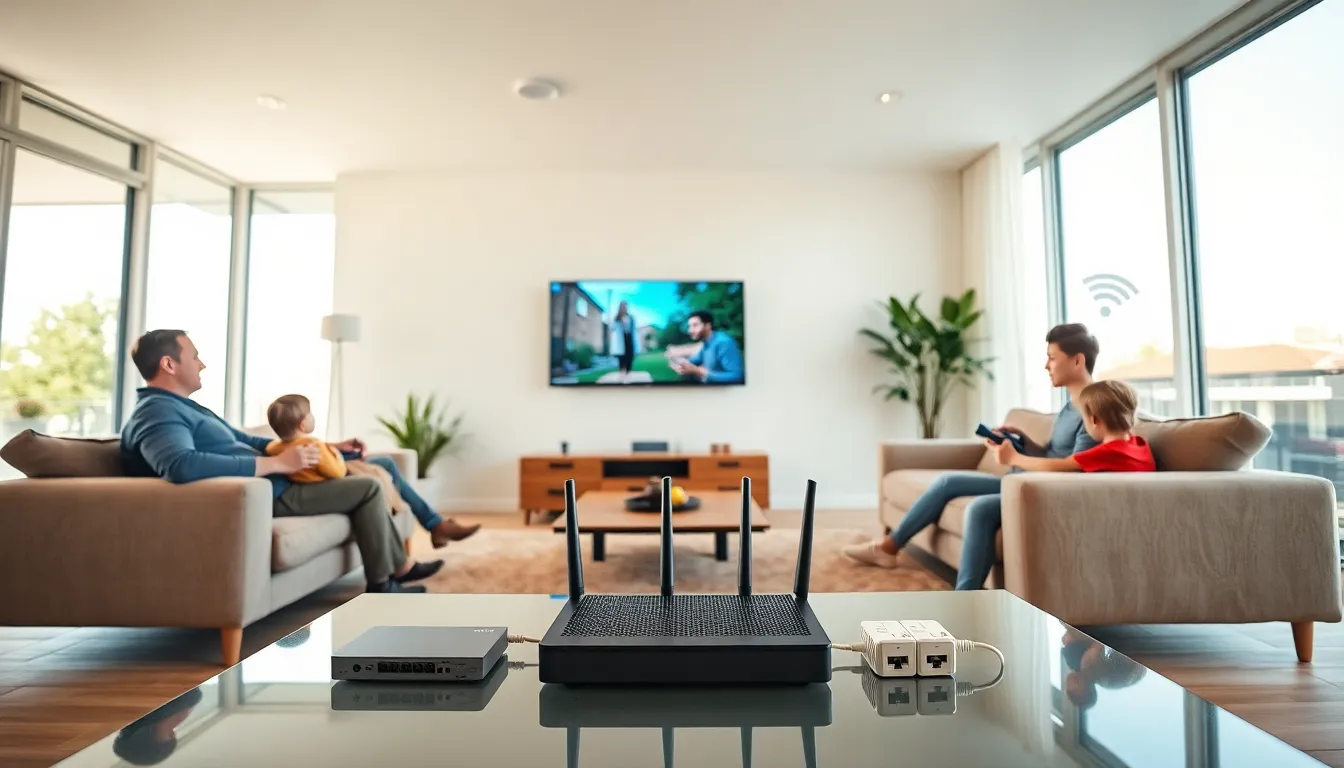In an age where smart fridges talk back and your coffee maker might just know your preferred brew time, understanding home networking is crucial. Home networking isn’t merely about connecting devices: it’s like setting up a dinner party where every guest needs to communicate efficiently to enjoy the festivities. If you’ve ever experienced the frustration of a buffering video or a dropped video call, you know just how essential a reliable home networking service is. A good network isn’t just a luxury: it’s a necessity in our connected world. So, let’s jump into the nuts and bolts of home networking services, from what they are to the intricacies that ensure you enjoy a seamless experience.
Table of Contents
ToggleWhat Is Home Networking?

Home networking refers to connecting devices within a residence, allowing them to communicate with each other and share resources like the internet, printers, and files. Imagine a network as a bustling highway. Instead of cars, you have laptops, smartphones, smart TVs, and perhaps even your home security system traveling and exchanging information.
These networks can be wired, using cables to connect devices, or wireless, using Wi-Fi signals to establish connections without the mess of cables cluttering your home. When properly set up, a home network creates a reliable foundation for your devices to work harmoniously, ensuring everyone at home can stream, game, or video chat effortlessly.
Importance of Home Networking Services
The importance of home networking services cannot be overstated. With nearly every device in our homes becoming ‘smart’, a robust network is the backbone of modern living.
- Increased Connectivity: These services ensure that multiple devices can operate simultaneously without lag. Consider a family of four, each member on their device for work or leisure, all demanding bandwidth. A well-configured home network can handle it all without breaking a sweat.
- Security: A good networking service keeps your devices secure from cyber threats. Think of it as a guard maintaining vigilance over your digital home. Regular updates, firewalls, and protective measures keep intruders at bay.
- Efficiency: Efficient home networking can enhance your home automation experience, allowing everything from lights to locks to function based on your preferences. Imagine asking your phone to turn off the lights and, voilà, it happens without a hitch.
- Cost-Effectiveness: With proper networking, one achieves more with fewer resources. It eliminates the need for additional devices by integrating functionalities into a single network.
Types of Home Networking Services
When considering home networking services, it’s crucial to understand the different types available. Here are a few categories to explore:
- Wired Networking: Perfect for those who crave stable and high-speed internet, wired networking connects devices directly through Ethernet cables. This option is best for gaming or streaming, providing a reliable and fast connection.
- Wireless Networking: Wi-Fi networks are ubiquitous in homes today. They offer convenience and flexibility, allowing devices to connect without pesky cables. With advancements like Wi-Fi 6, speeds and capacity have dramatically improved, accommodating more devices efficiently.
- Mesh Networking: For larger homes or spaces with tricky layouts, mesh networks use multiple devices working together to provide pervasive coverage. No more dead spots in your home.
- Powerline Networking: This unique approach uses existing electrical wiring to transmit data. It’s a great option for homes where Wi-Fi signals struggle to penetrate.
- Home Automation Networking: As home automation grows, specialized networking services cater to seamlessly integrating smart devices, lighting, heating, and security systems, creating a unified user experience.
Choosing the Right Home Networking Service Provider
Selecting the right home networking service provider can feel overwhelming. But, a few key factors can help narrow down the choices:
- Service Reputation: Research providers by reading reviews, visiting forums, and asking neighbors or friends about their experiences. An established provider with proven reliability will save you headaches in the long run.
- Range of Services: Look for a provider that offers a comprehensive suite of services, from installation to ongoing support. The ideal provider should be a one-stop shop for all your networking needs
- Customer Support: Consider how accessible and helpful customer service is. If issues arise, a responsive support team is invaluable.
- Flexibility in Solutions: Not every home is the same. The best service providers should customize their offerings based on your specific requirements, whether it’s a small apartment or a sprawling estate.
- Pricing Models: Transparent pricing is key. Providers should offer clear breakdowns of setup costs, monthly fees, and any hidden charges. Don’t get caught off-guard.
Common Home Networking Issues and Solutions
Even the best home networking setups can experience hiccups now and then. Here are some common issues and their straightforward solutions:
- Slow Internet Speeds: A frequent complaint for many households. Begin troubleshooting by restarting your router, this can often solve speed issues. If problems persist, check your bandwidth usage and consider upgrading your service if necessary.
- Dead Zones: Areas in your home lacking Wi-Fi coverage can be frustrating. Mesh networking solutions can eliminate dead zones and ensure a consistent signal everywhere.
- Device Connectivity Problems: Devices occasionally refuse to connect to the network. Ensure your router is up-to-date and double-check that the device isn’t experiencing a failure.
- Security Breaches: If you suspect your network has been compromised, change your passwords immediately, enable encryption, and consult with your provider for further protective measures.
Future Trends in Home Networking Services
As technology leaps forward, home networking services continue to evolve. Here are some trends to watch:
- 5G Integration: As 5G networks become more widespread, expect incredible speeds and low latency, revolutionizing how devices connect.
- IoT Expansion: The Internet of Things isn’t going anywhere. More smart devices mean networks will need to evolve to support them effectively without sacrificing performance.
- Artificial Intelligence: AI is set to play an important role in managing networks. Smart algorithms will optimize performance and security dynamically, learning usage patterns for efficiency.
- Increased Focus on Security: With rising cybersecurity threats, home networking services will place a premium on security. Expect enhanced protocols, including zero-trust models and more robust encryption practices.





